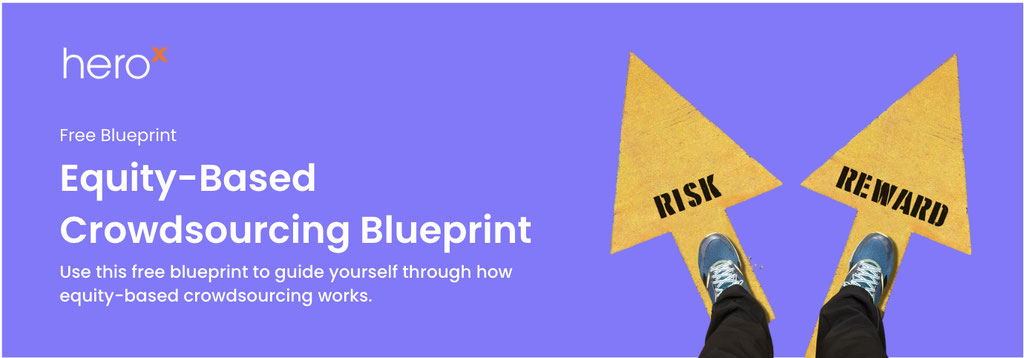
Crowdfunding is the process of requesting money from a large group of individuals (aka the crowd) via an online platform. Equity crowdfunding is similar in that you receive funds from the crowd; the main difference is that the investors will own a stake in your business.
In the News: Boxabl, Aptera Get Big Bucks Through Crowdfunding As VC For Consumer Startups Dwindles
Equity crowdfunding has many benefits that align with today’s economic and social climate. Cold emailing and elevator pitches aren’t for everyone, and crowdfunding is a more straightforward way to request funding. Investors are also more motivated when they are offered something tangible, like equity in the business, in exchange for their investment. Crowdfunding allows founders to craft a campaign, detail their business mission, and showcase why people should invest– all while avoiding breaking into a cold sweat before hitting the ‘send’ button.
How Equity Crowdfunding Works
Equity fundraising is raising capital through a group of individual investors in exchange for a piece of equity in the Sponsor’s company. By using crowdfunding platforms to launch and manage the campaign, founders can access money from the online community, or crowd, along with their wisdom and mentorship in some cases.
Looking to gain wisdom from the crowd for your business? Get in touch right here.
Three Types of Crowdfunding
There are essentially three main types of equity crowdfunding determined by the SEC:
1. Regulation D Equity Fundraising
Regulation D crowdfunding allows companies to sell equity in their business to accredited
(individuals with proof of assets exceeding $1 million or an income of over $200K) investors.
2. Regulation A+ Equity Fundraising
Regulation A+ crowdfunding permits the sharing of a company’s equity to accredited and non-accredited investors of up to $50M. This type of fundraising requires auditing tax statements for the previous two years.
3. Regulation CF Equity Crowdfunding
Regulation CF crowdfunding is the most popular form, allowing investments of up to $1M from both accredited and non-accredited investors.
Once the crowdfunding type is determined, the next step is to choose the crowdfunding platform to manage the campaign. Popular equity-based crowdfunding platforms include WeFunder, StartEngine, and Republic. Each platform has its pros and cons, for example, WeFunder is all-or-nothing when it comes to crowdfunding– literally. If your fundraising goals aren’t met, you don’t get to keep the funds raised. StartEngine has the benefit of Shark Tank’s Kevin O’Leary as an advisor but has a minimum fundraising goal requirement of $10,000. Republic dabbles in a few up-and-coming investments including crypto and music artists but has a relatively high fee structure.

Benefits of Equity Crowdfunding
Equity crowdfunding has many benefits, but as with any funding option, it has its advantages and potential drawbacks. Here are a few examples of the pros and cons of equity crowdfunding:
Advantages of Equity Fundraising:
- Accessibility of capital for small businesses and startups. Sometimes founders can’t access traditional means of funding their startups, and crowdfunding can be an excellent alternative.
- Opportunities for investors to invest in early-stage companies. Getting in on the ground floor of a new startup or concept can reap significant financial rewards. Most early-stage companies trade equity for funding to help get their budding business up and running.
- Potential for community engagement and support. In addition to quick access to funds, crowdfunding is an excellent opportunity to gain insights and support from seasoned professionals interested in investing in the venture.
Potential Drawbacks of Equity Crowdfunding:
- Risks for investors in early-stage companies. When investors fund early-stage companies in exchange for equity, there is an inherent risk involved that they could lose their money.
- Potential for fraud and scams. Although crowdfunding is considered a legitimate means of securing funding, it’s impossible to eliminate all of the scammers. There’s always a possibility that fraudulent investors can steal your idea or fabricate their own success stories of previous investments.
Although the drawbacks can make some investors nervous, plenty of regulations are in place to help thwart scams. Crowdfunding platforms are subject to practices adhering to the Securities and Exchange Commission (SEC) with certain safeguards in place to prevent fraud or illegal investments. Limitations on how much a single entity can invest and due diligence on both the founders and the investors are some examples of those safeguards.
Success Stories in Equity Crowdfunding
Equity crowdfunding success stories are everywhere and continue to become more prevalent as the practice gains popularity. Many businesses have dramatically increased visibility and profitability thanks to equity crowdfunding. Recent crowdfunding success stories include those from movers and shakers in the technology, Food & Beverage, and even motor vehicle industries. Oculus VR raised $2.4 million on Kickstarter before being acquired by Facebook; Scotland-based brewery BrewDog raised over £10 million through equity crowdfunding to expand its craft beer business, and Ellio Motors raised $17 million to develop a 3-wheeled vehicle. These are just a few examples of how crowdfunding has impacted the world of business and innovation.
Equity crowdfunding can also play a big role for companies and their surrounding communities. Through crowdfunding, startups can acquire funds from passionate investors who want the business to succeed. Oftentimes, the investors are investing in their own backyard– funding innovative companies, services, or residential properties headquartered in their town for the betterment of the area.
Conclusion
Equity crowdfunding is an excellent alternative to traditional fundraising, as it can provide faster access to funds than bank loans. Crowdfunding can also provide additional support, ideas, and mentorship opportunities otherwise unavailable to founders. With its ease of use, safeguards, success stories, and growing popularity, it seems like the future of equity crowdfunding is bright.
Interested in using the crowd to drive innovation and expand your organization’s impact? Host a crowdsourcing challenge with HeroX.










